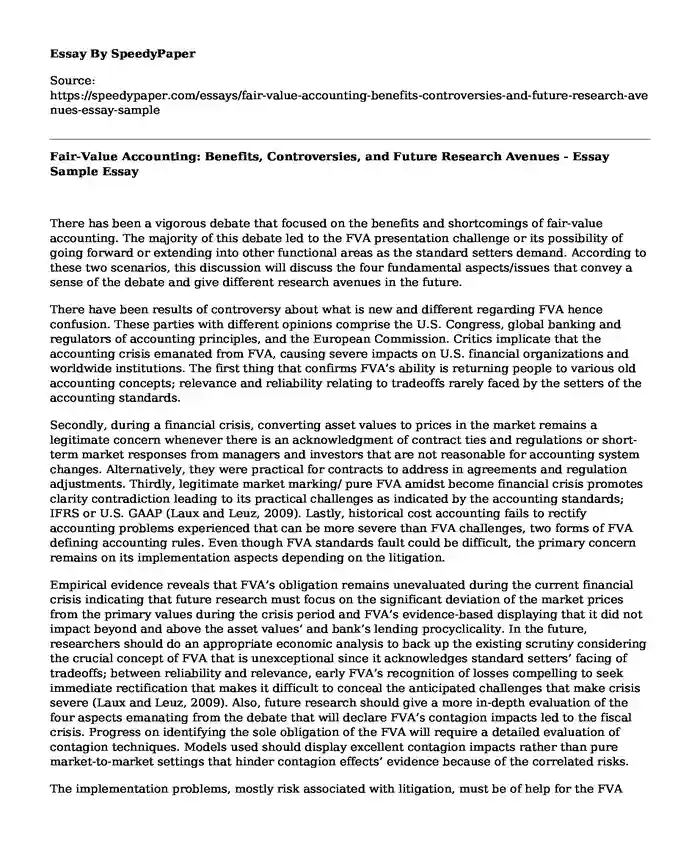
| Type of paper: | Essay |
| Categories: | United States Finance Accounting |
| Pages: | 3 |
| Wordcount: | 707 words |
There has been a vigorous debate that focused on the benefits and shortcomings of fair-value accounting. The majority of this debate led to the FVA presentation challenge or its possibility of going forward or extending into other functional areas as the standard setters demand. According to these two scenarios, this discussion will discuss the four fundamental aspects/issues that convey a sense of the debate and give different research avenues in the future.
There have been results of controversy about what is new and different regarding FVA hence confusion. These parties with different opinions comprise the U.S. Congress, global banking and regulators of accounting principles, and the European Commission. Critics implicate that the accounting crisis emanated from FVA, causing severe impacts on U.S. financial organizations and worldwide institutions. The first thing that confirms FVA’s ability is returning people to various old accounting concepts; relevance and reliability relating to tradeoffs rarely faced by the setters of the accounting standards.
Secondly, during a financial crisis, converting asset values to prices in the market remains a legitimate concern whenever there is an acknowledgment of contract ties and regulations or short-term market responses from managers and investors that are not reasonable for accounting system changes. Alternatively, they were practical for contracts to address in agreements and regulation adjustments. Thirdly, legitimate market marking/ pure FVA amidst become financial crisis promotes clarity contradiction leading to its practical challenges as indicated by the accounting standards; IFRS or U.S. GAAP (Laux and Leuz, 2009). Lastly, historical cost accounting fails to rectify accounting problems experienced that can be more severe than FVA challenges, two forms of FVA defining accounting rules. Even though FVA standards fault could be difficult, the primary concern remains on its implementation aspects depending on the litigation.
Empirical evidence reveals that FVA’s obligation remains unevaluated during the current financial crisis indicating that future research must focus on the significant deviation of the market prices from the primary values during the crisis period and FVA’s evidence-based displaying that it did not impact beyond and above the asset values’ and bank’s lending procyclicality. In the future, researchers should do an appropriate economic analysis to back up the existing scrutiny considering the crucial concept of FVA that is unexceptional since it acknowledges standard setters’ facing of tradeoffs; between reliability and relevance, early FVA’s recognition of losses compelling to seek immediate rectification that makes it difficult to conceal the anticipated challenges that make crisis severe (Laux and Leuz, 2009). Also, future research should give a more in-depth evaluation of the four aspects emanating from the debate that will declare FVA’s contagion impacts led to the fiscal crisis. Progress on identifying the sole obligation of the FVA will require a detailed evaluation of contagion techniques. Models used should display excellent contagion impacts rather than pure market-to-market settings that hinder contagion effects’ evidence because of the correlated risks.
The implementation problems, mostly risk associated with litigation, must be of help for the FVA standards’ performance and the reporting techniques from the bank during the period of crisis. It is, therefore, essential for future research to explore the possibility of complementing the existing FVA content and analyze the essentials in the organizational framework. These interactions will assist in describing accounting policies, and comprehending the function of the FVA during the prevailing crisis is essential in deciding whether the expansion of FVA's other functional areas and assets or not.
Similarly, the research available focuses on the role played by FVA in this financial crisis, and thus future research should show the functions of HCA in the same trouble. Considering this approach will improve the precision of the evidence required about losses exceeding the fair value.
The debate triggers the possibility of clarifying the notable weaknesses of FVA, and therefore, researchers must consider the loophole created during its implementation. HCA contributes to specific roles, but it is not in this context; hence, future research should give out its findings.
References
Laux Christian, Leuz Christian. (2009): “The Crisis of Fair Value Accounting:
Making Sense of the Recent Debate.” Forthcoming in Accounting, Organizations, and Society. The University of Chicago, Booth School of Business, and Goethe-University Frankfurt.
Cite this page
Fair-Value Accounting: Benefits, Controversies, and Future Research Avenues - Essay Sample. (2024, Jan 23). Retrieved from https://speedypaper.com/essays/fair-value-accounting-benefits-controversies-and-future-research-avenues-essay-sample
Request Removal
If you are the original author of this essay and no longer wish to have it published on the SpeedyPaper website, please click below to request its removal:
- Free Essay Sample on Texas Politics
- College Students Should Not Be Paid - Argumentative Essay Example
- Line Item Budget for Drug Court - Free Essay on Budgeting
- Contract Audit Essay Example
- Access to Affordable Health Insurance, Free Essay Example
- Paper Example. Nestle Company International Accounting/Industry and Organization.
- Fear, Response, and Macroeconomic Expectations Amid COVID-19 in the US - Free Essay
Popular categories




